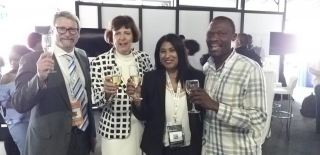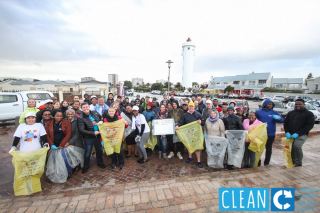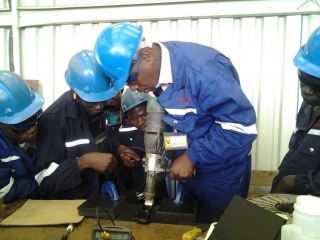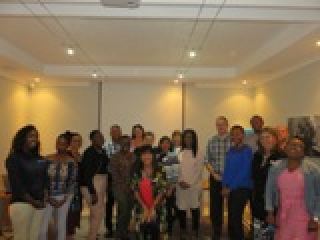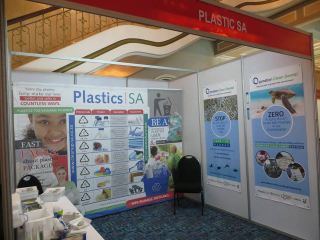PLASTICS INDUSTRY UPBEAT AND HOPEFUL FOLLOWING SUCCESS OF PLASTICS COLLOQUIUM
Plastics SA, the umbrella body representing all sectors of the South African Plastics Industry (including polymer producers and importers, converters, machine suppliers, fabricators and recyclers) has congratulated the Department of Environmental Affairs, Forestry and Fisheries (DEAFF) on the hosting of a very successful Plastics Colloquium in Boksburg recently.
According to Anton Hanekom, Executive Director of Plastics SA, they applaud DEAFF Minister Barbara Creecy’s pro-active approach, openness and willingness to learn first-hand about the many successful projects that the various role-players in the plastics industry have initiated and been running over the past 10 years. “As an industry, we have been the first to acknowledge the need to reduce the impact plastics have on the environment and ensure that plastic litter does not end up in our oceans, water sources or anywhere in nature. To this end, Plastics SA and the four plastic Producer Responsibility Organisations (PROs), namely Petco, Polyco, SAVA and the Polystyrene Association of SA have launched various recovery and recycling projects, with which we have had great success. It was encouraging that Minister Creecy created an opportunity for the industry to showcase these achievements to her, her department and other environmental groups. Instead of blindly bowing to the pressure of anti-plastic campaigners, she expressed a willingness to engage with us,” Hanekom says.
An estimated 500 people representing the entire plastics value chain attended the Plastics Colloquium on the 21stand 22nd of November, which was presented in collaboration with the Consumer Goods Council South Africa (CGCSA) and Plastics SA. More than 50 exhibitions demonstrated the plastics industry and other stakeholders’ commitment to Extended Producer Responsibility, recycling and creating a circular economy. Attendees represented government, civil society, brand owners, recyclers, waste management companies, waste pickers, NGO’s and SMMEs who were all encouraged to attend the presentations, panel discussions and visit the exhibitions.
Speaking at the opening of the Colloquium, Minister Creecy said: “Plastics have been with us since the 1950s. Because it is so versatile, it is used throughout modern society. The material is waterproof, durable, versatile and inexpensive. However, these characteristics are precisely what create so many pollution problems. With the growth in plastic consumption, concerns about plastic pollution are also growing”. She praised the work done by both government and the private sector in terms of the setting up of infrastructure for the recovery and recycling of plastic and the informal sector for collecting much of these materials, but warned that the evidence suggested much more still needed to be done.
“It is time to combine the wealth of collective experience to relook at the complex and difficult problem. Considering the whole value chain and lifecycle of products, the aim is to develop a comprehensive plan as part of an ongoing initiative that would engage all citizens to create a love for South Africa and the environment,” Creecy said, highlighting the need for a holistic approach to be taken in line with the principles of the circular economy.
“We found it hugely reassuring to hear that the Minister shares our passion to get South Africans recycling and separating their waste at home. By implementing effective waste management services at municipalities around the country, we will be able to get access to good quality, recyclable waste and reduce the burden on our country’s landfills. This will also be a major step forward in preventing plastic from entering our rivers and, eventually, the sea,” Hanekom says.
Another major focus at the Plastics Colloquium, was the importance and value of creating a circular economy. “Waste can be converted into value. Every ton of waste that ends up on dumpsites creates one job opportunity. However, every ton of waste that gets recycled, creates 18 jobs," the Minister stressed. Key to creating a circular economy is ensuring that plastic products and packaging are designed with their recyclability in mind. To this end, the challenge was made to brand owners, packaging designers and manufacturers to design products that are not only fit-for-purpose, but also environmentally responsible.
Looking ahead and explaining what the next steps will be, Hanekom says the Minister and her team will be drawing up a Master Plan, consisting of targets and timeframes, in consultation with industry. “The working groups of the SA Initiative to End Plastic Waste will continue their work and will be giving quarterly feedback to the Minister about their progress. They have been tasked to develop evidence-based solutions that will fit our unique South African context, and come back with suggestions and recommendations. A second Plastics Colloquium is proposed for next year to monitor the progress made and ensure that the plans are implemented effectively and that all of the talking that has happened until now, doesn’t end up as empty promises,” he explains. “We are optimistic about what the future holds for the plastics industry and the rest of the country as a whole. It is clear that for the first time in many years a relationship of trust has developed between government, industry and other role-players. There is a spirit of cooperation and a willingness to work shoulder to shoulder to find the best solution possible for everybody concerned,” Hanekom concludes.
For more information, please visit www.plasticsinfo.co.za
WORLD CLEANUP DAY 2018
Plastics|SA is proud to be partnering with Let’s Do It! Africa in the first ever World Cleanup Day that will be taking place on Saturday, 15 September 2018, by providing resources towards the biggest, global cleanup event that the world has ever witnessed.
On this day, more than 150 countries around the world will be mobilized to pick up litter. World Cleanup Day will start in New Zealand when the sun rises, and moving around the globe with the time zones until it sets, end in Hawaii 36 hours later. South Africa is proud to be one of the 60 countries from the African continent who will be participating in this year’s event!
Background
It is estimated that each year, 8 million tonnes of litter end up in the environment - causing a serious threat to people, wildlife, soil, water and air. The World Cleanup Day is a call to action for the public, decision makers and all citizens alike, to take real action in solving the waste problem.
For the past 22 years, Plastics|SA has been partnering with Ocean Conservancy by coordinating South Africa’s involvement in the annual International Coastal Cleanup Day. This annual event takes place on the third Saturday in September and sees thousands of volunteers each year collecting and removing litter from our waterways as part of Cleanup & Recycle SA week. This year, the week will take place from 10-15 September 2018 - culminating in the first World Cleanup Day on Saturday, 15 September 2018.
“This is the biggest positive civic action the world has seen, and we are fortunate to be part of this global movement that hopes to inspire change in human behaviour,” says Douw Steyn, Sustainability Director of Plastics|SA.
Plastics|SA’s commitment to reducing packaging waste
Packaging waste continues to be one of the biggest culprits when it comes to pollution of our water sources and marine environment. However, as one of the first signatories of the Marine Debris Declaration, whereby 74 plastics associations from around the world have committed themselves to fight marine litter in 2011, Plastics|SA actively supports projects in six key areas aimed at contributing to sustainable solutions, namely education, research, public policy, sharing best practices, plastics recycling/recovery, and plastic pellet containment.
“We have managed to get other packaging streams and retailers to support our efforts and recycling initiatives, such as our beach clean-ups, Operation Clean Sweep, sponsoring litter booms and the Aqua Amazing schools’ education programme. Last year alone, we donated 350 000 yellow refuse bags that were used for clean-ups around the country and assisted coordinators with audited clean-ups,” he says.
Approximately 80% of ocean litter is derived from land based waste. Without effective waste collection, an avalanche of debris will enter the ocean. To prevent this, Plastics|SA is not only encouraging South Africans of all ages, races and backgrounds to participate in this year’s Cleanup and Recycle SA week activities and World Cleanup Day, but also to be responsible in their daily activities by ensuring their recyclables are collected for recycling as we all continue to work towards a common goal: creating a cleaner world.
Launching World Cleanup Day in South Africa
South Africa’s participation in the World Cleanup Day was launched at a beach cleanup that took place at Milnerton’s Woodbridge Island in Cape Town last week. Attending the event was Erik Solheim, United Nations Environment Executive Director, who joined Clean C, the Department of Environmental Affairs, Let’s Do It Africa team, Plastics|SA and other organisations. Solheim said it was very encouraging to see the enthusiasm and the efforts by locals to protect the ocean and keep the beaches clean.
“South Africa is doing great and it is fantastic to see so many people being mobilized. Your country has some of the most beautiful beaches in the world and has a very long coastline. However, more needs to be done. We see the problem of litter on the beaches and marine environment all over the world. The good news is humans created this problem, but we can definitely solve it too. We need to clean the beaches and keep them beautiful, but we also need to stop the garbage coming from the source,” Solheim encouraged.
For more information, visit http://cleanupandrecycle.co.za/ or www.letsdoitworld.org
A BRIGHT FUTURE AWAITS TRAINED THERMOPLASTIC WELDERS
Plastics|SA put welding skills, learnership programmes, technology and the latest welding equipment in the spotlight at its third Thermoplastics Welding Technology Day that took place at its head office in Midrand recently.
Interested students, industry members, journalists and technical trainers attended presentations that focused on the importance of thermoplastic welding, standards, processes and conformance assessments, improving welding and reporting. The latest welding equipment and techniques were also put on display by Rothenberger, Plastiweld, Horner, Astore Keymak, Marley Pipe Systems and Plasti-Tech, who were on hand to answer questions and to demonstrate the latest development in thermoplastic welding, such as the digital recording of the welding parameters by the welding machines.
Explaining the importance of exposing students and the industry to the opportunities and developments within the Thermoplastics welding industry, Isaya Ntuli, Plastics|SA’s Regional Training Manager, says: “The future looks bright for qualified thermoplastic welders in South Africa. With Thermoplastic welding now a preferred method of joining HDPE or PVC pipes used in mining, municipalities, construction and various other fields where plastic pipe applications are used, these welders are able to find work in many different industries and their skills are in high demand”.
Plastics|SA trained more than 400 welders in Gauteng alone during their last financial year, and continues to see an increase in enrolments for their Thermoplastic Fabrication learning programme each year. Learners are attracted from various fabricators and contractors, with news of the programmes often spread through word-of-mouth, articles in the media or interest generated through the company’s website. A Matric qualification is not required, nor is a proficiency to read or write in English as assessments can be conducted verbally.
The training itself covers different processes, including butt welding, electrofusion, hot air, socket, solvent and geomembrane. 50 % of the learning content is practical work, which requires the learners to perform the actual welds. One such practical welding skill that is being taught and which helps set learners apart from other welders, is bends fabrication. “This is definitely a welding skill that is growing in demand, because a learner that can fabricate the bends, can work in a workshop and in the fields. We address the fabrication skills through our NQF Level 3 and NQF Level 4 offerings of Thermoplastics Fabrication,” Isaya says.
Plastics|SA’s learning programmes are Merseta accredited, which requires that learning content be developed to satisfy qualification outcomes. To this end, regular interaction and meetings take place with industry role players, such as the Installation and Fabrication Plastics Pipe Association (IFPA) and fabricators.
“We also involve IFPA members in the development of our learning material, including any new offerings such as our recently introduced Welding Inspector course, to ensure that we produce learners who are in step with the latest developments and who are able to meet the industry needs and expectations,” Isaya explains.
The introduction of a welder identification system a few years ago has helped to greatly improve the industry by ensuring consistent high quality of welding and introducing transparency and accountability. A unique welder number is allocated to each welder to assist with traceability. In addition, Plastics|SA has also recently upgraded to digital certificates with QR Codes that allow quicker verification onsite through a free QR Reader app which can be downloaded on a smartphone and which already exists on an iPhone. “This allows contractors to verify welders’ certificates onsite without having to call us, and helps to ensure a well-controlled learner management system,” Isaya concluded.
For more information about Plastics|SA’s Training Division and their learning programmes, visit www.plasticsinfo.co.za/training
-- ENDS --
Issued on behalf of Plastics|SA by Aim Marketing & Communications Consultants.For media enquiries, please contact (021) 531-0313 or (071) 083-5219. Email: This email address is being protected from spambots. You need JavaScript enabled to view it.
PLASTICS|SA’S TRAINING DIVISION HOSTS INFORMATION SHARING BREAKFASTS
Plastics|SA’s Training Division recently hosted a series of well-attended information sharing breakfasts at its regional offices in Cape Town, Port Elizabeth, Johannesburg and Durban with the aim of providing details of exciting new learning programmes that it will soon be offering.
Welcoming guests at all four events, Plastics|SA’s Training Executive, Kirtida Bhana, stressed the importance of offering relevant, up-to-date learning programmes that address the changing needs in the plastics industry. “Plastics are an important part of the country’s manufacturing sector. It is therefore critical to ensure that we have the correct skills in place to sustain our growth over the next few years to come,” she said.
According to Kirtida, these annual get-togethers offer their current and potentially new customers the ideal opportunity to become familiar with the Training Divisions offering, culture and values, whilst the training teams are on hand to answer any questions they may have regarding accessing funding, course content or tailoring courses to their specific needs.
Improving local content input and output
During the past financial year, Plastics|SA successfully trained more than 3 000 learners. Whilst the most popular learning programmes are those centred around the actual manufacturing processes (with quality and safety programmes being part of these), the Training Division also launched a National Certificate in Production Technology (NQF2) and Generic Management (NQF5) last year. Another important step forward is being able to run scheduled Pipe and Profile extrusion programmes at each of their regional offices, using their newly acquired extruders. Apart from theoretical grounding, students are now also equipped with much-needed practical experience in extrusion, blow moulding, injection moulding and the various plastics fabrication welding techniques.
“We were also in the fortunate position to be able to send some of our trainers overseas to be up-skilled and trained in the latest techniques. They brought this expertise back to South Africa and developed local course materials in line with international best practices,” Kirtida confirmed.
Exciting new training offerings introduced in 2018
Statistics for the past 3 years suggest that training spend has increased steadily year on year owing to the fact that companies are realising the value that trained staff undoubtedly add to their businesses. In order to keep up with this demand and to expand its service offering, Plastics|SA is now offering various new Learning Programmes that were developed specifically with the local training needs in mind. These include:
Scheduled pipe and profile extrusion programme.
After acquiring new pipe and profile extruders in all three factories nationally, these specific extruder programmes have now become part of our Scheduled programmes.
Production Technology NQF L2.
Since the technology of production goes hand in hand with the actual process technology, this offering is absolutely critical in addressing production related skills gaps. training breakfasts two more 2/…
A national certificate in Generic Management NQF L5
This is an exciting new offering that is in the pipeline for the new financial year starting in July 2018. Learners that have Supervisory Management NQF L4 are looking for progression. The Generic Management NQF L5 is the next step for these progressive learners.
Various online training options for soft skills
These are going to be available for all levels of the workforce including office-based staff and not just factory staff.
Other news of forthcoming programmes include the new Bachelor of Engineering Technology in Materials Engineering in Polymers that will be offered at TUT as from 2019, as well as a new 3-year Setter Trade Qualification (the first ever plastics related trade) launching later this year and will be offered by Plastics|SA.
Digital certification
Keeping up with modern trends, Plastics|SA will be issuing learners with digital certificates instead of hard-copy certificates as from the 1st of April 2018. One of the biggest benefits of going digital, is that it negates the need for printing of hard-copy certificates which have to be either be collected, posted or courier-delivered to a client’s premises. It also allows clients to always have access to learners’ certificates via the virtual ‘vault’ created for each client.
“Once learners have been found competent in a learning programme, Plastics|SA creates an original, digital certificate for each learner which is uploaded into an online “vault” - a user-friendly cloud platform from where these certificates can be viewed, e-mailed, printed or downloaded for easy reference,” Kirtida explained.
Other guest speakers
Guests who attended the breakfast sessions welcomed news of these exciting developments before being treated to a variety of different guest speakers who offered insights on topics relevant to each region. In Cape Town, Raldo Kruger of Green Cape spoke about the city’s current drought plans, the business opportunities that exist for plastic companies and what local companies should do to survive the current crisis. The Johannesburg session saw Matthews Moatli of Productivity SA and Matshidiso Phala of merSETA explain details about the grants that are available through merSETA and how companies should go about applying for this funding for training of their staff members. Thandolwethu Strydom from East Coast Radio entertained the KZN guests and spoke about the importance of everyone in society and how different skills are deeply valuable to the plastics industry, no matter what rung of the corporate or societal ladder these are played out from.
Each session ended with an exciting lucky draw during which guests won a variety of different plastic products and including training vouchers.
Conclusion
“We wish to thank everybody who took time out of their busy schedules to attend our information sessions and for the very positive feedback we have been receiving. Scenario analysts around the world agree that there will continue to be growing pressure and demands on the manufacturing industry in order to keep up with the demands of the population. We believe we are enabling manufacturers to be in the position where they can continue to reinvent themselves and remain competitive because they have a skilled work force that is able to perform well and do the job at hand. We truly believe that a knowledgeable employee is an asset to any company. For this reason, training should be seen as the ultimate motivational tool that every company needs to invest in,” Kirtida concluded.
For more information, visit www.plasticsinfo.co.za/training
African Marine Waste Conference Highlights need for more Collaboration, Communication and a Clear Game Plan for the Plastics Industry
The 2017 African Marine Waste Conference took place from the 9th to the 13th of July in Port Elizabeth, and was attended by approximately 200 delegates from 9 African states and a further 10 countries from other continents.
The inaugural African Marine Waste Conference was managed by the Sustainable Seas Trust (SST) under the leadership of Dr Tony Ribbink, CEO of SST, and aimed to continue the concerted effort of better managing marine litter with the help of governments, NGOs, researchers and other stakeholders across the African continent.
Plastics|SA hosted the first two African Marine Debris Summits that took place in Cape Town in 2014 and 2016 with the support of UNEP (United Nations Environmental Programme), the Department of Environmental Affairs and SANBI (SA National Biodiversity Institute), and also participated in the launch of the African Marine Waste Network that took place in Port Elizabeth in July last year.
“This year’s conference built on the initiative started three years ago to create a platform for African and international delegates and experts to discuss issues relating to marine waste around the African continent, including data and research, capacity building, prosperity through the development of economic enterprises centred on waste management, education and awareness and the role of the consumer, government, industry and municipalities. The focus at this year’s event was on finding innovative solutions that would cater to African circumstances and cultures and using opportunities to shape a brighter future for the human health, economies and environments of Africa,” explained Douw Steyn, Sustainability Director at Plastics|SA.
“By bringing together delegates primarily from Africa, along with advisors from other continents, a variety of different sectors and insights were represented. We participated in various fruitful discussions and debates on issues relating to marine waste in Africa, enabling us to develop a strategic plan entitled “Marine Waste Strategy: Guide to Action for Africa”, for tackling and alleviating the continent’s waste problems,” Steyn disclosed
In addition to presentations, panel discussions and parallel sessions, workshops on microplastics, data and research, and mobile applications were also held over the duration of the conference. Plastics|SA chaired an industry workshop featuring participants from various sectors. Industry representatives, scientists, educators, waste disposal experts and the maritime sector were encouraged to engaged in a debate which aimed to identify the issues that have the biggest impact on the marine environment.
The following points were highlighted during the plastics industry panel discussion
- It is vital that industry has awareness of marine waste issues
- Communication between industry members needs to be improved in order to integrate fragmented initiatives, avoid duplication and promote best environmental practices. Focus should not be exclusively on packaging companies but should expand to include the maritime industry.
- Industry should take responsibility of marine waste issues by encouraged to be compliant and accountable
- Alliances and partnerships between sectors are also lacking and current public partnerships are too few and ineffectual. Industry needs to collaborate more openly and sincerely.
- Knowledge gaps in technology and data should be addressed.
- Recycling levels in South Africa and the perceived value of waste should be improved.
- Clear master plans need to be developed with tangible outcomes within specific timeframes and with impactful marketing plans to increase participation and buy-in by the general public.
“The plastics industry has long been involved in efforts to reduce plastic marine litter, from conducting research to enhancing product stewardship to cleaning up beaches. As the umbrella body representing the entire South African Plastics industry and a signatory of the Declaration of the Global Plastics Associations for Solutions on Marine Litter, Plastics|SA will continue to support and collaborate with industry efforts aimed at combatting marine litter.
We recognise that there is still a lot of work that needs to be done, but look back at very big inroads that we have already managed to make to address the problem head-on and offer real solutions. If we continue to take the right steps, we believe that waste can indeed become profitable to countries of Africa. The environment, human health and tourism are but a few areas that stand to benefit significantly if we are to devise a workable strategy for managing waste in and around our continent,” Steyn concluded.
The next African Marine Waste Conference set to take place in 2019. For more information or a detailed report about this year’s conference, visit https://africanwastenetwork.org.za or www.plasticsinfo.co.za.

